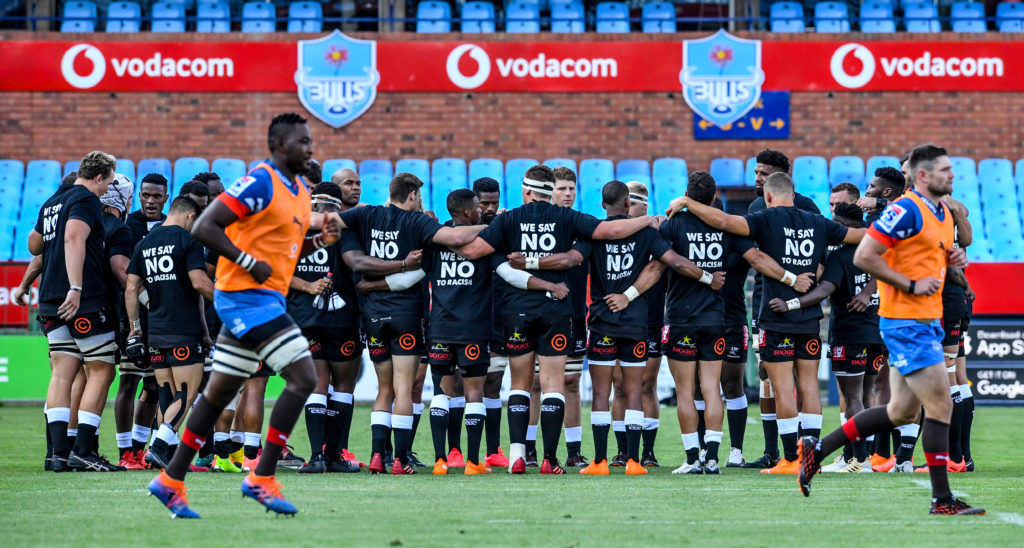Policing kneeling is stupid. Understanding why many don’t kneel is critical, writes RYAN VREDE in the latest SA Rugby magazine.
READ: What’s in our latest issue?
Eight South African players representing the Sale Sharks chose not to kneel in solidarity with the Black Lives Matter (BLM) movement in August, sending self-righteous liberals into meltdown.
None of the players have explained their decision to remain standing. They don’t have to. It is within their rights to do so.
Given the spirit of the time, it doesn’t look good. But the optics are largely irrelevant. You can’t police free will, as so many have tried to do by shaming and harassing the players involved.
There are a complex mix of factors rooted in your conditioning and socialisation, particularly in your formative years, that will determine whether you kneel or stand.
Personally, as a liberal progressive who was raised with principles that underpin my world view and ideology, I would kneel because the central message of the BLM movement – equality for all – resonates with me. That doesn’t mean I make a moral and/or ethical judgement on those that choose not to for reasons that aren’t underpinned by racial prejudice.
I take issue with those who argue that all lives matter. Yes, they do. However, not all lives matter until black lives matter, which they simply don’t, certainly not to the degree that white ones do. This is self-evident and if you continue to deny the impact of historical oppression and systematic racism on black people in a present-day context, you are a fool.
Drilling further, in South Africa, many critics of the BLM movement have argued that farm murders and violent attacks are equally consequential, yet aren’t afforded the national outcry because those are crimes against whites. The two are separate but equally significant causes. A failure to separate the two is willful ignorance.
None of the players who remained standing has shared their reasons for doing so. Again, they don’t need to and I choose to believe the best in them until they give me reason not to.
I was puzzled by the backlash they received, firstly because of the free will that governs the decision to kneel or stand, and secondly because the vast majority of white professional athletes do kneel in support of the BLM movement. Those that don’t are in a small minority and it frustrates me that people would expend energy on criticising their decision, when they could spend that energy on advancing the cause in meaningful ways.
What is the point? Even if those who remained standing did so for reasons rooted in racial prejudice, what will an attack from supporters of the movement achieve? Certainly not the transformation of the heart and mind needed to relinquish this prejudice.
Racial prejudice is learned through subtle and purposeful conditioning over a number of years. It therefore stands to reason that unlearning of that conditioning would only happen over time, and, critically, if the starting point for their healing is an acknowledgement that there were deep flaws in that conditioning to begin with. If a tweet or Facebook comment were able to cure racism, we’d be living in racial Utopia.
I’d like to see Sale, and any other rugby clubs faced with this challenge, engage privately with the players who decide not to kneel. They must gain an understanding of why the players remained standing – should the players be open to sharing this – and, if racial bias based on formative conditioning is exposed, they must give those players all the counter-intelligence they need to make an informed decision on whether to kneel or stand in the future.
This saves the players from counter-productive public lynching and does all one can in the face of racial bias (in this context) – to provide the information needed to unlearn flawed race-related conditioning.
It pains me that sports minister Nathi Mthethwa tried to pressure SA Rugby into shaming the players who chose to stand. Governments must govern. They can’t legislate compliance in this case, and they certainly can’t police free will.
Broadly speaking, I suspect the white, conservative (players, administrators and fans) opposition to kneeling is rooted in a fear of a further loss of power. There is a sense of ownership of rugby among this group. To their mind, they played it first and best and continue to do so. Compounding this is that rugby is a cornerstone of their cultural identity.
‘The blacks have taken our country, and now they’re coming for our game’ appears to be the underlying sentiment. They won’t relinquish that power without a fight. And that fight has many expressions, one of them being a refusal to kneel in solidarity with who they perceive to be thieves of their property.
The reality is that nobody owns rugby. It belongs to the people.
*This column first appeared in the latest SA Rugby magazine, now on sale!
Photo: Gallo Images





